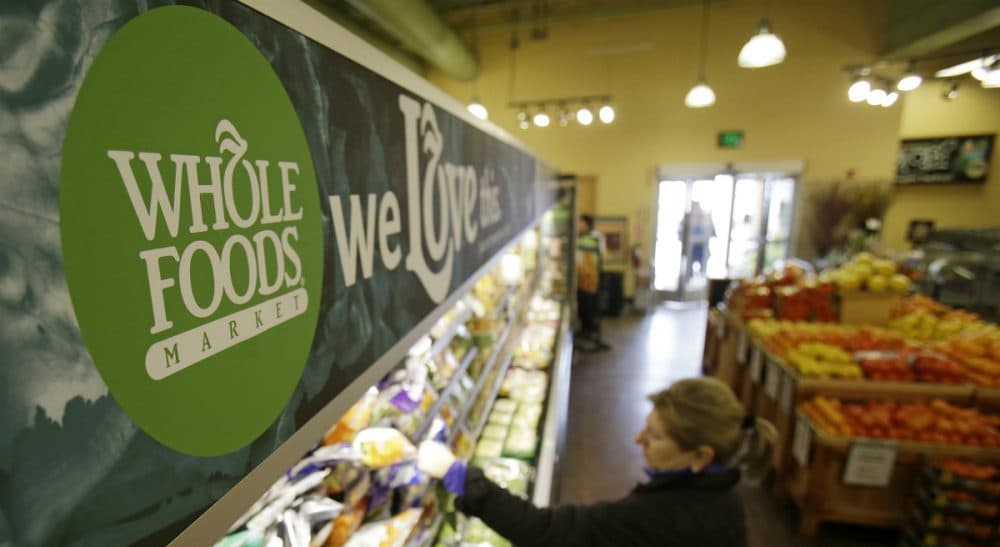Advertisement
The Limits Of Whole Foods’ Enlightened Business

This month, the Supreme Court will rule whether subsidies that help some people buy insurance under the Affordable Care Act (ACA), or Obamacare, are illegal. Meanwhile, Whole Foods has announced it will open new stores targeted to younger buyers, with prices well south of those that earned the chichi chain the unflattering moniker "Whole Paycheck."
What's the connection? Sadly, plenty. In Massachusetts, despite those hefty prices and pay scales high for its industry, Whole Foods is among the big employers that have had workers needing state health programs in recent years. Other grocers, including owners of the lauded, lower-priced Market Basket and corporate success stories like Walmart, also tapped taxpayers for workers' health needs.
What hasn’t changed is the financial plight of retail workers.
The legal case for Obamacare will come down to a semantic rumble over four disputed words in the law (more on that momentarily). For the moral case, look no further than the worker who guides you to that pricey quinoa on the shelf, or to that fire sale-priced toy for which Junior has been begging.
The legal background: The ACA created online markets (the so-called health exchanges) for people to shop for insurance. States were encouraged to create their own exchanges; in states that balked, the feds created and run them. The law authorizes subsidies for eligible consumers in exchanges “established by the state.” Those four words got the high court got into the Affordable Care Act after four Virginians, backed by a conservative advocacy group, sued the government, saying the law’s language permits subsidies only in states with their own exchanges. If they win, subsidies to buyers in the three dozen states with federally run exchanges would lose that aid. The court is to rule by June’s end.
Democrats and Republicans involved in writing and passing the law unanimously affirm that Congress intended subsidies to flow to every state, regardless of who runs the exchange. Whether that sways a court with four justices who deemed the ACA unconstitutional three years ago remains to be seen. From a policy perspective, since the law requires individuals — necessarily -- to get health insurance, subsidies for those who can’t afford decent policies is obviously a no-brainer.
Which brings us to Whole Foods. CEO John Mackey touts his “conscious capitalism,” promoting healthy eating, environmentally produced food, donations to good causes and progressive management. “In a retail world dominated by low-road employers like Walmart and McDonald’s, Whole Foods bucks the trend by offering higher wages, a decent health care plan, and a voice to workers to improve their workplace,” sociologist Nicole Aschoff writes in her recent book, "The New Prophets of Capital."
But Aschoff notes the limits of enlightenment, citing a Massachusetts state report on employers with 50 or more workers needing public health programs in 2010. Whole Foods made the list with 756 subsidized workers. (The commonwealth itself topped the list with the most workers needing help, at 6,000-plus, fueled by part-timers ineligible for insurance, new hires waiting for insurance eligibility, and other factors. Walmart had more than 4,000; Demoulas Supermarkets, owner of Market Basket, more than 2,000.)
To be sure, there is much to admire in the way Whole Foods does business, not to mention Market Basket; in the latter’s case, many commentators noted the oddity of its workers striking last summer to save the job of their wealthy CEO, who also pays unusually good wages and benefits while holding down prices. Also, 2010 was the midst of the Great Recession, and the state hasn’t updated its report. A recovering economy, along with Massachusetts’ broadened Medicaid program for the poor (the result of Obamacare!) likely changed the numbers.
What hasn’t changed is the financial plight of retail workers. Just before Christmas, one penned a piece for Salon about his three months on Whole Food’s payroll in 2012 before quitting. A part-timer who nonetheless worked full-time, he bewailed “a very common indignity in the U.S. workforce: working 40 hours a week while still being chronically broke.”
Conscious capitalism, after all, must be conscious of its limits.
A 2013 report last year pegged the national cost of taxpayer support — not just Medicaid but programs like food stamps and housing — for needy Walmart employees at $6.2 billion. This is corporate welfare in the most literal sense of the word. Obamacare meanwhile has defied critics carping about it leading to a busted federal budget, or more uninsured people, or higher premiums, or the heartbreak of psoriasis/whatever. In fact, despite shortcomings, it has done none of those things.
The foregoing cries out for a number of reforms, starting with a higher minimum wage, which needn’t torpedo the economy. As for the Supreme Court case, the cleanest (and the most legally sound) fix would be a victory for the Obama administration. Failing that, thoughtful businesspeople should support whatever rewrite of the ACA may be necessary to ensure that 7.5 million people imperiled by lost subsidies can keep them. Conscious capitalism, after all, must be conscious of its limits.
